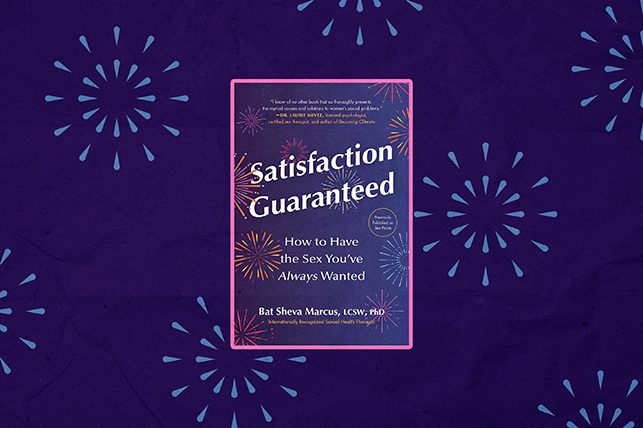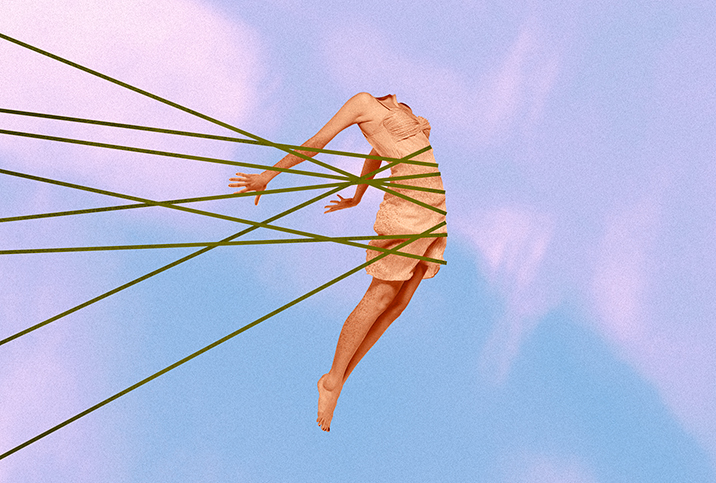Between the Pages: 'Satisfaction Guaranteed' Promises a Good Sex Life

While women obviously deserve to have a good sex life, Bat Sheva Marcus, L.C.S.W., Ph.D., promises they can have one. The veteran sex therapist firmly believes this is achievable for all women, and explains how it can be done in her new book, "Satisfaction Guaranteed: How to Have the Sex You've Always Wanted."
Originally released in hardcover as "Sex Points" in 2021, this update lays out an easy-to-understand 100-point system for scoring your sex life, which includes four categories: libido, orgasm, pain and arousal.
In this exclusive interview with Giddy, Marcus discusses her unique background and provides tips on orgasms and choosing a vibrator that's right for you.
Editor's note: This interview has been edited for length and clarity.
Tell us about your background and how it led you to write this book.
Marcus: I have an unusual story because I'm an Orthodox Jewish woman. I grew up in a pretty conservative home where sex was never talked about. I grew up feeling like I didn't have the information I needed or wanted. I felt so embarrassed by how little I knew. I made it my business to be the person who knew about sex. I have a master's in social work and I went into community organization, and about 25 years ago, I pivoted and started working with someone who was trying to set up fertility laboratories. It was one of those weird moments in time when I was bored and wanted something different.
It was urologists who worked with male sexual dysfunction, and I was a social worker. I was fascinated with the topic of female sexual dysfunction. Nobody was paying attention to women. If they were, they thought everything was psychological. About 25 years ago, the field started realizing women's sexual health was not solely mental. If you were a guy 50 years ago and you had ED [erectile dysfunction], they would have sent you to a therapist. You could have talked until you were blue in the face, but if your blood flow wasn't working, it wasn't going to help. And so people started realizing, "Oh, maybe everything is not in women's heads."
I was involved in creating the first women's center [Maze Women's Sexual Health in New York City] which merged the medical and the psychological together. The results we had were incredible. We looked at every avenue of what was going on with women, rather than assuming she didn't have any desire because she wasn't interested in her partner or there were problems in the relationship.
We also looked at the medications she was on and the hormones. Because the results were so resoundingly successful, I wanted to get that message out to women all over the world. I get calls from women where they're feeling like they're crazy because their sex life isn't working. I wanted to take all this really complicated medical and psychological information and break it down into something understandable for every woman in a way that puts it within their own power to fix.
You've developed a large social media presence with 270,000 followers on TikTok. Do you find that social media can be a good tool for sex education?
I call myself "InstaGrandma" because I'm so old and new to this technology. When my agent told me I had to get on it because my book was coming out, I was like, "I'd rather have my toenails removed with no anesthesia." Meanwhile, I have come to love social media. I feel like it's such an excellent platform for educating. I put so much material on TikTok and Instagram. I feel like where else would I get a platform where I can educate a quarter of a million women on a regular basis?
You have to be really careful, though, because there's so much misinformation and poppycock out there, especially once you start moving into the medical piece of it. You need to be really careful and look at the credentials of the person you are following. Beyond that, I have found so many women have found it so helpful.
So many of my clients have been following me for a while, so they get a good handle on the approach I have, and when they start to see me, they feel like they know me. That is such a relief for someone who needs to talk about their sex life. Going up and talking to a stranger is scary, and it allows me to be a little more personal with people.
What are the basics of the 100-point system, how does it work and how can it help a woman's sex life?
Every woman who comes to see me with sexual problems wants to figure out what's broken, whether that's pain, arousal or problems having orgasms. Basically, "Let's find the thing that's broken and fix it." That's not a good model to use when you're thinking about your sex life.
A much more effective model for getting help is to think about it like you need to hit a 100-point threshold to have good sex. Those points can come from so many places, such as your relationship, your sense of your body, your hormone levels, your general health, how much sleep you're getting, how much sun you're getting, how pissed off you are at your partner, how many kids you have banging at the door, etcetera.
All the points are coming or going based on life situations, physiological realities and psychological realities. When you realize that, you're not looking for one solution to solve your problem. You're looking for a myriad of places where you can bank some points or get some new points. This makes women feel like things are way more in control than they think they are. I think it gives them a sense of hope that there's actually a whole variety of things they could do to change their sex life today without identifying one problem.
A lot of women experience pain during sex. What do you find to be the most common causes of that?
"Dyspareunia" means painful intercourse. I am always amused when a woman gets diagnosed with that because she diagnosed herself. You know if intercourse is hurting you. Then the question is, "What is causing the dyspareunia?" It's a number of different conditions, and pretty much all are treatable.
There can be tight muscles. There could be hormonal fluctuations, which affect the skin. And there could be neurological shifts that happen. Each of the pain conditions can be partially based on those. You can't always know instinctively what's creating the pain because something that feels like it may affect your skin could actually be tight muscle.
Once women understand what's going on, it's much less frightening and it gives them hope they can actually get help. It makes them educated consumers when they go to their doctors and say, "This is what I'm experiencing. I think this is what it is. Could we try the following technique?"
Some women say they rarely have orgasms but they can feel themselves getting really close to having one. What do you find are the main reasons for being on the cusp of having an orgasm, and what can be done to help them get over the hump?
When women are having trouble with orgasms, one of the things I find is they're very quick to re-blame themselves: "I'm not trying hard enough. I'm not concentrating hard enough." All that's doing is making the situation worse. Usually, if you're getting to a point where you are close but can't have an orgasm, there's some neurology issue going on. It doesn't mean there's something wrong with you neurologically, it just means you have a higher threshold.
The things that are most powerful for women to help them get past that are vibrators, which I always say are the most underused tool in women's sexual arsenal. And the other is fantasies. People forget how much neurological stimulation comes from the brain, so if they can get themselves really turned on from the brain, then it makes it much easier to hit that threshold.
There is a wide array of vibrators on the market. If a woman is new to them, they may feel a bit overwhelmed. What would be your guidance for women in choosing a vibrator that's right for them?
I break this down in my book. There are thousands of vibrators out there, but once you understand the categories, there are really only four. And then it becomes much easier to establish which one is right for you.
For women having orgasm problems, external vibrators are really what they need, not internal vibrators. Internal vibrators are good if you don't have a partner or you want something bigger inside your vagina. But for most women, the clitoral stimulation is coming from an external vibrator.
You don't have to spend a lot of money on vibrators. That's the biggest myth. You can if it's fun. But the cheap, simple vibrators are great. The power of the vibrator is very important. These cute, tiny ones that people gravitate toward because they're innocuous are often not super-helpful.


















